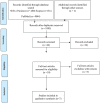Role of probiotics in preventing Clostridioides difficile infection in older adults: an integrative review
- PMID: 37636573
- PMCID: PMC10450140
- DOI: 10.3389/fmed.2023.1219225
Role of probiotics in preventing Clostridioides difficile infection in older adults: an integrative review
Abstract
Clostridioides difficile infection (CDI) is the leading cause of healthcare-associated diarrhea. This infection can particularly affect older adults, the most susceptible to CDI. Currently, the standard therapeutic measure is antibiotic therapy, which in turn increases the risk of recurrence of the infection by its collateral damage to the patient's microbiota. Probiotics are live microorganisms capable of maintaining balance in the intestinal microbiota. This study aims to perform an integrative review of the protective benefit of probiotics in CDI and diarrhea associated with C. difficile. The PubMed, Scopus, and Web of Science databases, the 10-year time cutoff, and the Prism Flow diagram were used for data collection. We observed no consensus among the studies; however, three of the seven evaluated studies demonstrated that the use of probiotics in older adults could contribute to reducing the incidence of hospital-onset CDI. We also found that the studies evaluated a wide variety of microorganisms, particularly Saccharomyces boulardii, associated with beneficial effects. More research is needed to understand the successful use of probiotics in the prevention of CDI in hospitalized older adults receiving antibiotics.
Keywords: Clostridium difficile; Saccharomyces boulardii; antibiotics; diarrhea; elderly; infection; microbiota.
Copyright © 2023 Barbosa, Albano, Martins, Warren and Brito.
Conflict of interest statement
CW was Scientific advisor for Seres Therapeutics and received a grant (NIH NIAID AI145322). The remaining authors declare that the research was conducted in the absence of any commercial or financial relationships that could be construed as a potential conflict of interest.
Figures
References
Publication types
LinkOut - more resources
Full Text Sources



